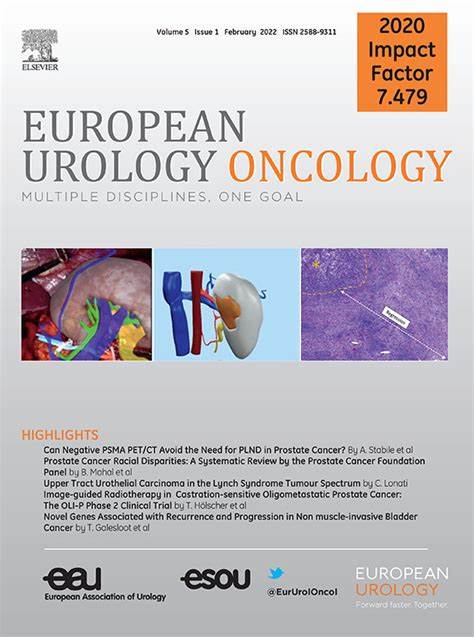预测激素敏感或阉割耐药转移性前列腺癌患者治疗反应的循环生物标志物:系统回顾
IF 8.3
1区 医学
Q1 ONCOLOGY
引用次数: 0
摘要
背景和目的:转移性前列腺癌(mPCa)的基因组改变可预测靶向治疗的疗效。这些改变不仅可在组织中发现,还可直接在生物液体(即液体活检)(主要是血液)中发现。液体活检可能是监测接受 mPCa 治疗的患者的一种更安全、创伤更小的替代方法。目前的研究重点是描述和验证新型预测性生物标记物,以改善对mPCa的精准医疗。我们的目的是系统回顾目前有关预测 mPCa 治疗反应的液体生物标记物的证据:我们系统地检索了 Medline、Web of Science 和循证网站上 2013 年 3 月至 2024 年 2 月期间有关 mPCa 循环生物标志物的出版物,以进行回顾。研究终点为:预测治疗(化疗、雄激素剥夺疗法、雄激素受体通路抑制剂[ARPIs]、免疫疗法或PARP抑制剂[PARPIs])后的总生存期、生化或放射学无进展生存期。对于每种生物标记物,临床有效性的证据级别(LOE)均已确定:LOE IA和IB为高证据等级;LOE IIB和IIC为中等证据等级;LOE IIIC和LOE IV-VD为弱证据等级:在转移性激素敏感型前列腺癌(mHSPC)和阉割耐药型前列腺癌(mCRPC)中评估了每种生物标志物对几种疗法反应的预测价值。在mCRPC患者中,BRCA1/2或ATM突变可预测对ARPIs(LOE IB)和PARPIs(LOE IIB)的反应,而循环肿瘤细胞(CTC)中的AR-V7转录物或AR-V7蛋白水平可预测对ARPIs和紫杉类药物(LOE IB)的反应。CTC定量可预测对卡巴他赛、阿比特龙和镭-223的反应(LOE IIB),而TP53改变可预测对177Lu前列腺特异性膜抗原放射性配体治疗的反应(LOE IIB)。第一线治疗前和后续治疗前循环肿瘤DNA中的AR拷贝数可预测对多西他赛、卡巴他赛和ARPIs的反应(LOE IIB)。在mHSPC中,淋巴细胞中的DNA损伤可预测对镭-223的反应(LOE IIB):结论与临床意义:液体活检中检测到的BRCA1/2、ATM和AR改变可帮助临床医生管理mPCa患者。其他循环生物标志物未达到常规临床应用所需的 LOE,应在前瞻性独立研究中进行验证。患者总结:我们回顾了评估血液或尿液中生物标志物对转移性前列腺癌治疗价值的研究。证据表明,某些生物标志物有助于选择符合特定治疗条件的患者。本文章由计算机程序翻译,如有差异,请以英文原文为准。
Circulating Biomarkers Predictive of Treatment Response in Patients with Hormone-sensitive or Castration-resistant Metastatic Prostate Cancer: A Systematic Review
Background and objective
Metastatic prostate cancer (mPCa) harbors genomic alterations that may predict targeted therapy efficacy. These alterations can be identified not only in tissue but also directly in biologic fluids (ie, liquid biopsies), mainly blood. Liquid biopsies may represent a safer and less invasive alternative for monitoring patients treated for mPCa. Current research focuses on the description and validation of novel predictive biomarkers to improve precision medicine in mPCa. Our aim was to systematically review the current evidence on liquid biopsy biomarkers for predicting treatment response in mPCa.
Methods
We systematically searched Medline, Web of Science, and evidence-based websites for publications on circulating biomarkers in mPCa between March 2013 and February 2024 for review. Endpoints were: prediction of overall survival, biochemical or radiographic progression-free survival after treatment (chemotherapy, androgen deprivation therapy, androgen receptor pathway inhibitors [ARPIs], immunotherapy, or PARP inhibitors [PARPIs]). For each biomarker, the level of evidence (LOE) for clinical validity was attributed: LOE IA and IB, high level of evidence; LOE IIB and IIC, intermediate level; and LOE IIIC and LOE IV–VD, weak level.
Key findings and limitations
The predictive value of each biomarker for the response to several therapies was evaluated in both metastatic hormone-sensitive (mHSPC) and castration-resistant prostate cancer (mCRPC). In patients with mCRPC, BRCA1/2 or ATM mutations predicted response to ARPIs (LOE IB) and PARPIs (LOE IIB), while AR-V7 transcripts or AR-V7 protein levels in circulating tumor cells (CTCs) predicted response to ARPIs and taxanes (LOE IB). CTC quantification predicted response to cabazitaxel, abiraterone, and radium-223 (LOE IIB), while TP53 alterations predicted response to 177Lu prostate-specific membrane antigen radioligand treatment (LOE IIB). AR copy number in circulating tumor DNA before the first treatment line and before subsequent lines predicted response to docetaxel, cabazitaxel, and ARPIs (LOE IIB). In mHSPC, DNA damage in lymphocytes was predictive of the response to radium-223 (LOE IIB).
Conclusions and clinical implications
BRCA1/2, ATM, and AR alterations detected in liquid biopsies may help clinicians in management of patients with mPCa. The other circulating biomarkers did not reach the LOE required for routine clinical use and should be validated in prospective independent studies.
Patient summary
We reviewed studies assessing the value of biomarkers in blood or urine for management of metastatic prostate cancer. The evidence indicates that some biomarkers could help in selecting patients eligible for specific treatments.
求助全文
通过发布文献求助,成功后即可免费获取论文全文。
去求助
来源期刊

European urology oncology
Multiple-
CiteScore
15.50
自引率
2.40%
发文量
128
审稿时长
20 days
期刊介绍:
Journal Name: European Urology Oncology
Affiliation: Official Journal of the European Association of Urology
Focus:
First official publication of the EAU fully devoted to the study of genitourinary malignancies
Aims to deliver high-quality research
Content:
Includes original articles, opinion piece editorials, and invited reviews
Covers clinical, basic, and translational research
Publication Frequency: Six times a year in electronic format
 求助内容:
求助内容: 应助结果提醒方式:
应助结果提醒方式:


